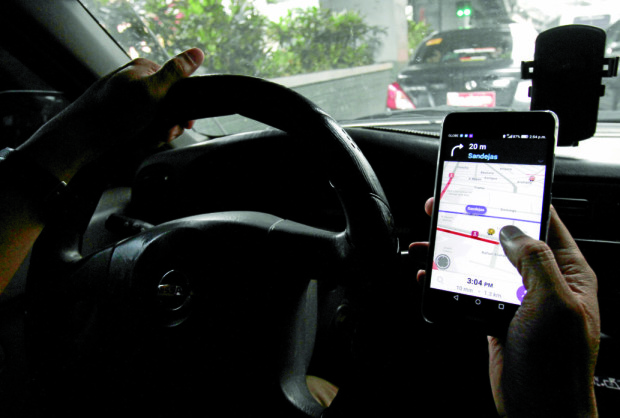Texting while driving banned under new law

A man drives while using his cellphone to check the traffic in Taft Avenue, Manila. INQUIRER PHOTO / RICHARD A. REYES
Drivers of cars and even “karetelas” face a fine, or worse, revocation of their licenses, if they use navigation apps like Waze or send text messages while their vehicles are moving.
They should pull over when checking the map or smartphone so as not to be penalized under the Anti-Distracted Driving Act, transport officials said on Wednesday.
The law prohibiting unrestrained use of electronic mobile devices (Republic Act No. 10913) will be enforced starting May 18, the effectivity date after the publication requirement of its implementing rules and regulations.
Audio navigation guides are allowed, but “if I need to look at the gadget and take my eyes off the road, then I have to pull the vehicle over so as not to obstruct traffic,” said Land Transportation Office (LTO) chief Edgar Galvante.
Galvante said the measure was aimed at promoting behavior for road safety and accident prevention.
Article continues after this advertisementChecking mobile devices while temporarily stopped for a red light or at an intersection is prohibited.
Article continues after this advertisementDash cams
Cell phones, two-way radios, video game consoles, calculators and laptops are some of the electronic devices covered by the law.
Galvante said televisions on buses would have to be removed if these draw the attention of the driver.
Dash cams can be placed in areas that do not obstruct the driver’s line of sight, such as the rearview mirror, he said.
Even if the gadget installed with a navigation aid is placed in an area that does not obstruct the driver’s view of the road, but he keeps looking at it, then he can still be apprehended, according to the LTO chief.
“It’s not the dash cam or the navigation aid but the behavior of the driver,” he said.
Uber, Grab drivers
Galvante said drivers of ride-hailing apps Uber and Grab who use Waze or Google Maps must review their route before driving.
Victor Nuñez, liaison officer of the Metropolitan Manila Development Authority (MMDA), said violators could be cited through the no-contact apprehension policy or screen grabs of traffic cameras.
The LTO, as the lead implementing agency, can deputize enforcers of the MMDA, the Land Transportation Franchising and Regulatory Board and the Philippine National Police Highway Patrol Group.
For inner streets, traffic enforcers of local governments will be authorized to carry out arrests.
The law provides exemptions for emergency situations and drivers who are penalized may contest the citation through the adjudication board.
Motorists can take calls through hands-free function or using earphones, but using the earphones to listen to music falls under “similar acts” prohibited by the law, according to the primer issued by the Department of Transportation.
Joevic Hernandez, an Uber driver, said that although the intention to discipline drivers was good, he was dismayed at the new law.
“It seems impossible not to check your phone, especially when the GPS (global positioning system) is acting up,” Hernandez told the Inquirer.